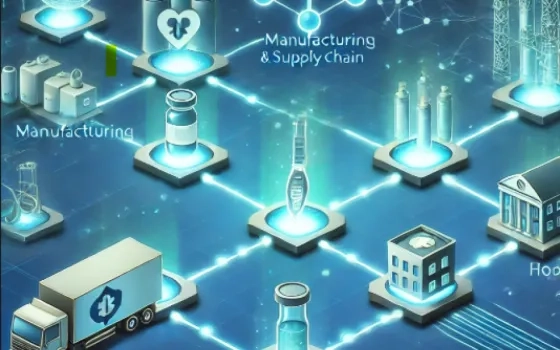In an era where the healthcare industry is increasingly reliant on advanced technology to streamline operations and improve patient outcomes, blockchain has emerged as a transformative force. Particularly in the management of medical supply chains, blockchain offers unparalleled transparency, security, and efficiency.
This technology holds the potential to address long-standing issues like counterfeit drugs, inefficiencies in logistics, and data breaches, which have plagued the sector for years. Its decentralized architecture and immutable nature make it a powerful tool for improving the integrity and traceability of the healthcare supply chain.
Understanding the Importance of Blockchain in Medical Supply Chains
The healthcare industry has long grappled with challenges in supply chain management, from ensuring the authenticity of medical products to maintaining efficient inventory systems. Blockchain technology provides a robust framework to overcome these issues. By leveraging a distributed ledger, healthcare organizations can track the movement of products across the supply chain with unparalleled accuracy. Every transaction is recorded on the blockchain, creating a tamper-proof record that enhances trust and accountability among all stakeholders.
One of the most pressing issues blockchain addresses is the proliferation of counterfeit medical products.
According to the World Health Organisation (WHO), counterfeit medicines constitute 10% of the global drug market. These substandard products not only jeopardize patient safety but also undermine the credibility of healthcare systems. Blockchain’s ability to provide an immutable record of a product’s journey from manufacturer to end-user ensures authenticity and significantly reduces the risk of counterfeiting.
Beyond tackling counterfeits, blockchain improves operational efficiency. The healthcare supply chain often involves multiple intermediaries, including manufacturers, distributors, and healthcare providers. Managing this complex web is resource-intensive and prone to delays. Blockchain automates key processes such as inventory management, procurement, and compliance checks, reducing administrative overheads and improving speed and accuracy.
Key Features of Blockchain-Based Supply Chain Management
Blockchain-based supply chain systems offer distinct features that make them particularly suitable for the healthcare sector. The technology’s immutability ensures that once data is recorded, it cannot be altered. This is critical in maintaining the integrity of medical supply chains, where data manipulation can have serious consequences. For instance, if the expiry date of a pharmaceutical product is tampered with, it could lead to the distribution of unsafe drugs.
Another essential feature is the traceability blockchain provides. Every movement of a product is recorded in real-time, creating a transparent system that stakeholders can access. This transparency is crucial in identifying and addressing bottlenecks in the supply chain. For example, in the event of a recall, blockchain can pinpoint the affected batches and locations, enabling swift and effective action.
Smart contracts further enhance the efficiency of blockchain-based systems. These are self-executing agreements that automate processes based on predefined conditions. For instance, a smart contract can trigger payment once a shipment reaches its destination, reducing delays and disputes.
Blockchain also facilitates compliance with regulatory standards such as the FDA’s track-and-trace guidelines, HIPAA, and GDPR. By providing a secure and transparent system, it ensures that healthcare organizations meet their legal obligations while safeguarding sensitive data.
The Benefits of Blockchain in the Medical Supply Chain
The benefits of integrating blockchain into medical supply chains are manifold. Blockchain's decentralized nature eliminates the reliance on a central authority, reducing the risk of system failures and bottlenecks. This resilience ensures uninterrupted operations, even in the face of unforeseen disruptions.
Enhanced security is another significant advantage. By employing cryptographic techniques, blockchain makes data virtually tamper-proof, reducing the risk of fraud and cyberattacks. This is particularly important in the healthcare sector, where data breaches can have severe repercussions for patient privacy and safety.
Moreover, blockchain improves patient safety by ensuring the authenticity and quality of medical products. Patients can access a product's transaction history, verifying its legitimacy and compliance with regulatory standards. This transparency fosters trust in the healthcare system and empowers patients to make informed decisions.
Real-World Applications of Blockchain in Healthcare Supply Chains
Several organizations have already begun harnessing blockchain's potential to revolutionize their supply chains. DHL, a global logistics leader, has implemented blockchain-based solutions to track and authenticate pharmaceutical products. This initiative reduces the risk of counterfeit drugs entering the supply chain, enhancing patient safety and trust.
French startup Blockpharma has taken a consumer-centric approach by enabling users to verify the authenticity of drugs through QR codes linked to blockchain records. This innovative solution has gained traction in combating counterfeit medicines, particularly in regions where regulatory enforcement is weak.
Retail giant Walmart has also ventured into blockchain for supply chain management, albeit in the food sector. However, the technology’s implications for medical supplies are evident. Walmart’s blockchain pilot has demonstrated improvements in traceability and efficiency, which can be replicated in healthcare supply chains to ensure quality control and reduce wastage.
Another noteworthy example is MediLedger, a consortium of pharmaceutical companies exploring blockchain’s potential for regulatory compliance and supply chain optimization. By facilitating secure and transparent data sharing, MediLedger aims to enhance collaboration among stakeholders and improve overall efficiency.
The Development of Blockchain-Based Supply Chain Systems
Developing a blockchain-based medical supply chain system involves several stages. The first is requirement gathering to understand the organization's specific challenges and goals. The second is designing the system architecture, which includes selecting the appropriate blockchain platform and establishing data storage protocols.
Smart contracts are then developed to automate critical processes, while APIs are integrated to ensure seamless communication with existing systems. Rigorous testing is conducted to identify and resolve any vulnerabilities, ensuring the system meets industry standards. Once deployed, ongoing maintenance and upgrades are essential to adapt to evolving regulatory requirements and technological advancements.
Challenges & the Road Ahead
While the benefits of blockchain in medical supply chains are transparent, its implementation is not without challenges. High initial costs and the complexity of integrating blockchain with existing systems can deter adoption. Additionally, the lack of standardization across the industry poses a barrier to seamless implementation.
However, as more organizations recognize the value of blockchain, collaborative efforts are emerging to address these challenges. Industry consortia, regulatory bodies, and technology providers are working together to develop standards and frameworks that facilitate widespread adoption.
Conclusion
Blockchain technology represents a paradigm shift in medical supply chain management, offering unprecedented levels of transparency, security, and efficiency. By addressing critical challenges such as counterfeiting and inefficiencies, blockchain has the potential to elevate the healthcare sector’s operational standards and improve patient outcomes.
As the technology continues to mature, its adoption is likely to become a cornerstone of modern healthcare supply chain management, paving the way for a safer and more efficient future.






















